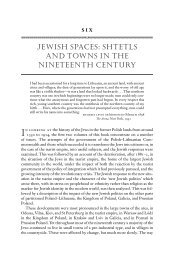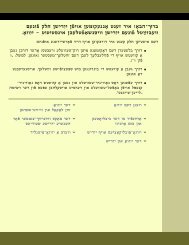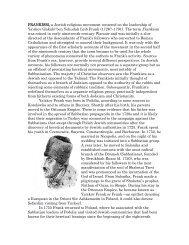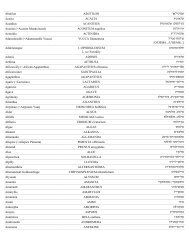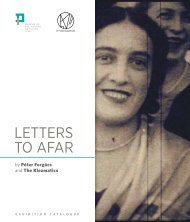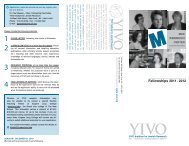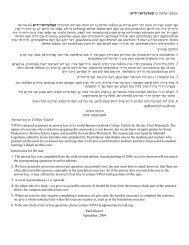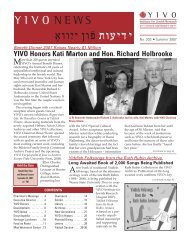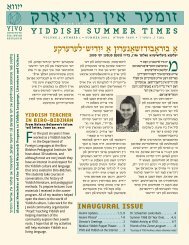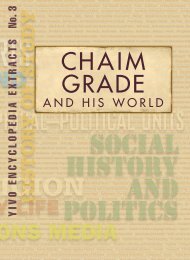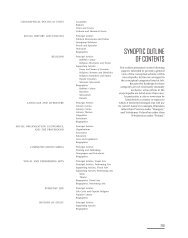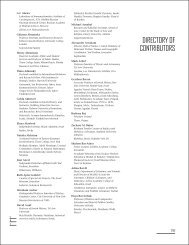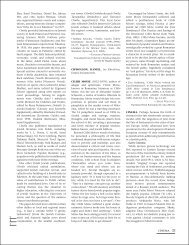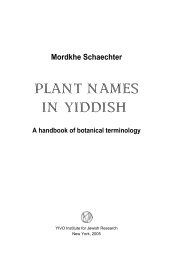Hebrew literature - YIVO Institute for Jewish Research
Hebrew literature - YIVO Institute for Jewish Research
Hebrew literature - YIVO Institute for Jewish Research
You also want an ePaper? Increase the reach of your titles
YUMPU automatically turns print PDFs into web optimized ePapers that Google loves.
S<br />
R<br />
L<br />
eral of her poems appeared in <strong>Hebrew</strong><br />
journals in Palestine and the United<br />
States in the 1920s.<br />
Beilin, Asher (Kiev, 1881–Tel Aviv,<br />
1948), storyteller and <strong>Hebrew</strong> and Yiddish<br />
critic. Beilin lived in London from<br />
1906 and moved to Jerusalem in 1933. He<br />
served as Sholem Aleichem’s secretary in<br />
Kiev and published in<strong>for</strong>mative memoirs<br />
about him.<br />
Ben-Avram, Ôayim Shalom (Liady,<br />
Ukr., 1893–Tel Aviv, 1965), writer and<br />
translator. Ben-Avram (originally surnamed<br />
Abramson and the brother of Mosheh<br />
Ôiyog [see below]) wandered across<br />
Eastern Europe and settled in Palestine in<br />
1935. He wrote poems, short stories, and<br />
a play, and translated works from several<br />
languages.<br />
Ben-David, Yehudah Leib (Vilna, 1855–<br />
Odessa, 1898), active member of a group<br />
of <strong>Hebrew</strong> socialists. Ben-David (Davidovits)<br />
was founder of the first association<br />
of <strong>Hebrew</strong> speakers in Odessa; he published<br />
articles in the <strong>Hebrew</strong> and <strong>Jewish</strong><br />
Russian press.<br />
Ben-Eli‘ezer, Mosheh (Shchuchin, Vilna<br />
region [now Belarus], 1882–Tel Aviv,<br />
1944), storyteller, critic, essayist, editor,<br />
and translator. Ben-Eli‘ezer (Glembotski;<br />
Yiddish pseudonym M. Lazarev) was very<br />
active in the field of <strong>Hebrew</strong> <strong>literature</strong><br />
and children’s newspapers, which he edited<br />
in Warsaw and Moscow; he lived in<br />
Palestine from 1925. He also edited and<br />
contributed to Yiddish periodicals in a<br />
number of cities and translated works<br />
from Yiddish into <strong>Hebrew</strong>.<br />
Ben-Or, Aharon (Ukraine, 1890–Tel<br />
Aviv, 1972), teacher and writer. Ben-Or<br />
(Urinovski) taught at various <strong>Hebrew</strong> educational<br />
institutions in Vilna, BiaËystok<br />
(where he also contributed to the Yiddish<br />
press), and, from 1933, Palestine. His<br />
works include the five-volume Toldot hasifrut<br />
ha-‘ivrit ha-Õadashah (History of the<br />
New <strong>Hebrew</strong> Literature; 1946–1955).<br />
Benshalom, Bentsion (Sanok, Galicia,<br />
1907–Tel Aviv, 1968), <strong>Hebrew</strong> instructor<br />
at the Jagiellonian University in Kraków.<br />
Benshalom (Kats) published studies on<br />
<strong>Hebrew</strong> <strong>literature</strong> and translated Greek<br />
and Persian classics. He immigrated to<br />
Palestine in 1940.<br />
Ben-Ya‘akov, YitsÕak Isaac (Vilna,<br />
1801–Vilna, 1863), pioneer of the <strong>Hebrew</strong><br />
Haskalah in Lithuania. His major work,<br />
Otsar ha-sefarim (Book Treasury; 1877–<br />
1880)—a comprehensive bibliography of<br />
the <strong>Hebrew</strong> book since its origins, about<br />
17,000 books and manuscripts in various<br />
<strong>Jewish</strong> languages written with <strong>Hebrew</strong><br />
letters—was published by his son.<br />
Berger, YitsÕak Aryeh (Ohanov, Galicia,<br />
1907–Holocaust years), poet. Berger<br />
taught in various towns of Galicia and<br />
published poetry in the <strong>Hebrew</strong> press. His<br />
sole poetry collection is Tevel gova‘at (A<br />
Dying Universe; 1934).<br />
Berman, Shelomoh (Chernigov region,<br />
Rus., 1857–Gomel, 1927), author of popular<br />
history books, biographies, and textbooks.<br />
His most popular book, Mi-Gibore<br />
ha-umah (From the Nation’s Heroes;<br />
1898–1911), is a series of biographical<br />
studies of great figures in <strong>Jewish</strong> history.<br />
Bernstein, Yisra’el (Stolbtsy, Minsk region,<br />
1848–Bobruisk, 1912), prominent<br />
maskilic essayist. His satirical articles<br />
against rabbis and yeshiva education<br />
(published in the monthly Ha-ShaÕar)<br />
made a strong impression on his readers.<br />
Bisko, Aharon Leib (Saint Petersburg,<br />
1859–Dolinov, Vilna region, 1929), author<br />
of textbooks, dictionaries, and study<br />
guides. Bisko wrote frequently about <strong>Hebrew</strong><br />
education and language. He also<br />
translated works from Russian into Yiddish<br />
and published a Yiddish–<strong>Hebrew</strong><br />
dictionary (1913). He lived in England between<br />
1902 and 1927.<br />
Blank, Shemu’el Leib (Dunaevstsy, Ukr.,<br />
1891–Philadelphia, 1962), fiction writer.<br />
Blank lived in Bessarabia from 1909 and<br />
moved to the United States in 1923. He<br />
published short stories and novels based<br />
on rural <strong>Jewish</strong> life in Bessarabia and that<br />
of <strong>Jewish</strong> immigrants in the United<br />
States.<br />
Bloch, Shimshon Ha-Levi (Kalikow,<br />
Galicia, 1784–Kalikow, 1845), one of the<br />
first Galician maskilim. His masterpiece,<br />
Shevile ‘olam (Pathways of the World;<br />
1822) represented the first attempt to impart<br />
geographical knowledge to the <strong>Hebrew</strong><br />
reader.<br />
Bosak, Me’ir (Kraków, 1912–Tel Aviv,<br />
1992), writer and poet. Beginning in<br />
1929, Bosak published Polish and <strong>Hebrew</strong><br />
review essays, short stories, and poems as<br />
well as studies on the history of Polish<br />
Jewry. He lived in Israel from 1949.<br />
Bunin, Ôayim YitsÕak (Gomel, 1875–<br />
Treblinka, 1943), belles lettrist. Bunin<br />
lived in Warsaw and Êódß from 1910,<br />
where he also wrote <strong>for</strong> the Yiddish press;<br />
he was a prolific researcher of Ôabad Lubavitch<br />
Hasidism, about which he wrote<br />
many published articles. From 1916 to<br />
1939, he was a teacher in a <strong>Jewish</strong> high<br />
school in Êódß.<br />
Dykman, Shelomoh (Warsaw, 1917–<br />
Tel Aviv, 1965), skilled translator of Greek<br />
and Roman classics into <strong>Hebrew</strong> and <strong>Hebrew</strong><br />
poetry into Polish. Incarcerated in<br />
Siberia from 1944 to 1957 <strong>for</strong> engaging in<br />
Zionist activities, Dykman moved to Israel<br />
in 1960.<br />
Eichenbaum, Ya‘akov (Krystynopol,<br />
Galicia, 1796–Kiev, 1861), early poet of<br />
the Russian Haskalah period. His first<br />
book was Kol zimrah (The Voice of Song;<br />
1836). Eichenbaum was also famous as a<br />
mathematician. His grandson, Boris, was<br />
a prominent Russian <strong>for</strong>malist critic.<br />
Feigenberg, RaÕel. See listing under “Feygenberg,<br />
Rokhl” in appendix to Yiddish Literature,<br />
article on Yiddish Literature after<br />
1800.<br />
Fernhoff, YitsÕak (Buczacz, Galicia,<br />
1868–StanisËawów, 1919), Galician <strong>Hebrew</strong><br />
<strong>literature</strong> activist. Fernhoff edited<br />
the series Sifre sha‘ashu‘im (Leisure Books;<br />
1896–1899) as well as other anthologies.<br />
He wrote short stories depicting Misnaged<br />
culture. Fernhoff also contributed<br />
to various Yiddish and <strong>Hebrew</strong> periodicals<br />
in Galicia. His son, Mosheh (b.<br />
Buczacz, 1889), was a prolific Yiddish<br />
poet, writer and journalist; he died during<br />
the Holocaust.<br />
Foner, Me’ir (Braásk, Grodno region,<br />
1854–Êódß, 1936), playwright. Foner was<br />
involved in pedagogic activities in BiaËystok<br />
and Êódß. His main literary works<br />
consist of seven plays on ancient <strong>Jewish</strong><br />
history. He also contributed to the Yiddish<br />
press in Êódß and championed<br />
avant-garde Yiddish poetry.<br />
Foner, Sarah Meinkin (Zager, Lith.,<br />
1855–Pittsburgh, 1937), wife of Me’ir<br />
Foner and one of the first female <strong>Hebrew</strong><br />
writers. Beginning in 1881, Sarah (Sheyne<br />
Feyge) Foner wrote adventure books and<br />
historical fiction <strong>for</strong> children and adults<br />
in both <strong>Hebrew</strong> and Yiddish. She also<br />
wrote memoirs of her childhood in<br />
Dvinsk, which she translated into Yiddish.<br />
Frank, Avraham (Mariampol, Lith.,<br />
1884–Holocaust years), children’s author.<br />
Frank lived in Warsaw from 1909, working<br />
as a pharmacist. His main works consist<br />
of short stories and poems <strong>for</strong> chil-<br />
HEBREW LITERATURE 705<br />
MS3



